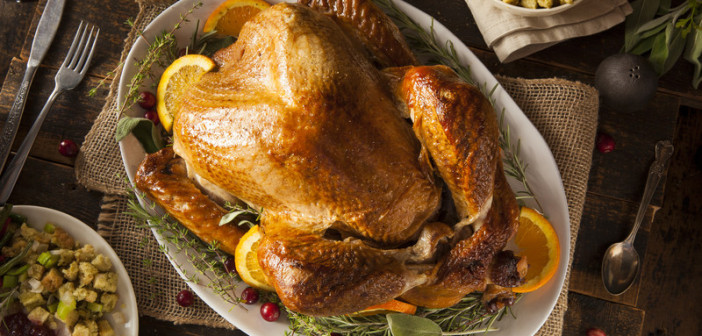Whether you’re an animal rights activist or simply looking to live a healthier lifestyle, switching to an organic, pasture raised turkey this Thanksgiving holiday is a good idea.
The heart wrenching living conditions of conventionally raised turkeys have been documented time and time again by animal welfare advocacy group Mercy for Animals. Sadly, with thousands of turkeys being raised in close quarters at many traditional factory farms, the conditions that Mercy for Animals uncovered are not unusual. The turkeys we are enjoying while giving thanks are forced to live an unimaginably painful life.
Beyond that, the health implications of eating factory farm raised turkeys can be serious, as these birds are fed a diet of grain and supplements like antibiotics and growth hormones, and are packaged with artificial flavors and colors for an attractive display at your local supermarket.
Today, roughly 80% of antibiotics used in the United States are fed to animals that are slaughtered for our consumption. This mass overuse of antibiotics in farm animals is contributing to increased antibiotic resistance and is creating a human health crisis.
Every year, 2 million people in the United States get infections that are resistant to antibiotics and at least 23,000 die as a result. Alarmingly, the World Health Organization has named resistance to antimicrobial agents one of the most significant global threats to public health.
Growth hormones may be of equal concern. Ractopamine is a growth enhancer that is used to increase weight gain and promote feed efficiency in turkeys. It is banned in over 160 countries around the world including the European Union, Russia, China and Taiwan due to its suspected health effects, which may include; birth defects, hyperactivity and decreased fertility.
An organic turkey is raised without the use of pesticides, antibiotics or hormones throughout its entire life. The farm facilities and distribution methods are inspected by the USDA before being certified. Taste-wise, the skin browns beautifully and crisps well,
There are a number of turkey farms in NJ that raise their birds humanely and free from additives. You can also check out your local health food stores, like Deans and Whole Foods, for your organic turkeys. If you plan to order one, make sure you put your order in as soon as possible, since supply goes fast.










